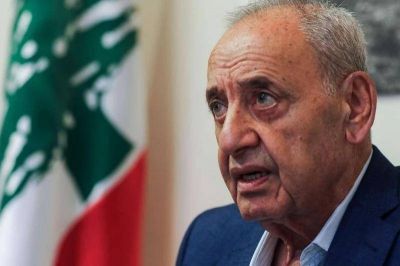Speaker of the Lebanese Parliament Nabih Berri. (Credit: AFP)
The race for the presidential election is getting more complicated in Lebanon as the end of the term of the head of state, Michel Aoun, on Oct. 31, approaches. "I will not convene a session to elect a president of the republic until the reform laws requested by the International Monetary Fund are adopted," said Parliament Speaker Nabih Berri in a press statement on Saturday. The head of the legislature also called for Aoun and Prime Minister-designate Najib Mikati to meet Monday to try to form a new government, which he said would be a "miracle."
In Lebanon, it is the members of Parliament who elect the president, and as of Sept. 1, the speaker can schedule a meeting to find a successor to Aoun, with whom Berri has a stormy relationship. Several more or less unofficial candidates are already in the running: the leader of the Lebanese Forces, Samir Geagea, who has set himself up as a "natural candidate" and his rival from the Free Patriotic Movement, Gebran Bassil, who seems ready to give up but who believes he has a say in the next head of state. A third candidate would be the leader of the Marada movement Sleiman Frangieh, who is a favorite according to some observers, even though he has not officially declared himself a candidate. Finally, the name of the commander-in-chief of the army, Joseph Aoun, has been circulating for some time.
No election without reforms
It remains to be seen whether the presidential election will take place within the time limits set by the constitution, in a country used to not respecting such deadlines, due to endless political wrangling.
The Parliament speaker set a new condition on Saturday: "I will not call for a session to elect the president of the republic until the reform laws requested by the International Monetary Fund are passed. In the midst of an economic crisis, and in a state of advanced decay, Lebanon signed a preliminary agreement with the IMF, which provides aid of $3 billion over four years on condition that the authorities implement a series of reforms: adoption of the 2022 budget, restructuring of the banking sector, audit of the BDL ... So many reforms that have not yet been implemented.
"The president must have a Christian sensibility, a Muslim sensibility, but above all a patriotic sensibility," Berri also said, without elaborating on who might fit that description. Two days ago, Frangieh said he was "one team" with the head of the legislature, following a meeting between the two men in Ain al-Tineh. The Maronite leader of Zghorta is increasingly presenting himself as a serious presidential candidate.
Aoun-Mikati meeting Monday?
If the race for the presidency is in full swing, the question of forming a new government to succeed Mikati's cabinet seems to have been buried. Since May 22, the government has been in charge of current affairs, and negotiations are at a standstill after an imbroglio between Mr. Mikati and Mr. Aoun, the former having presented a draft that did not satisfy the latter, after the non-binding parliamentary consultations of June 29.
"It will take a miracle for the government to be formed," Berri ironically argued on Saturday. "I contacted Mikati and asked him to hold a meeting of the three presidents (Aoun, Mikati and Berri), or a meeting between him and Aoun for the army holiday on Monday," he said. In the first draft presented by the prime minister-designate, the caretaker Energy Minister Walid Fayad, an Aounist close to the FPM, was dismissed from his post, without compensation. A proposal that created tensions with Baabda, President Aoun has in turn proposed several formulas to Mr. Mikati. Since then, the two men have not seen each other, alternately blaming each other for the impasse.
'It's all or nothing!'
On the subject of the maritime border dispute with Israel, Berri was formal: "Lebanon wants the entire Qana field, it's all or nothing!" he said. After the visit of the American mediator Amos Hochstein to Beirut in early June, the authorities had given him a new proposal to extend Line 23 to include the entire Qana gas field. Since the arrival of a gas platform in the disputed Karish gas field, tensions between Israel and Hezbollah have been rekindled, especially since the party sent three drones into the Karish area, which were intercepted by the Israeli army. The leader of Hezbollah Hassan Nasrallah has threatened Israel war on several occasions, to which Israel has also responded with threats.
This article was published in French in L'Orient-Le Jour.
